Governance UMADHV-15-2: Analyzing the Development of UK Corporate
VerifiedAdded on 2023/06/10
|8
|2113
|330
Essay
AI Summary
This essay provides a critical analysis of the development of corporate governance in the UK, referencing the Cadbury Report and subsequent measures implemented to foster better governance. It explores the agency theory and its influence on UK corporate governance, including the implementation of codes and regulations. The essay highlights the importance of board diversity, stakeholder involvement, and the "compliance or clarification" approach. It also discusses the role of executive compensation and the need for ethical corporate culture, referencing the Volkswagen scandal as an example of governance failure. The essay concludes by proposing financial diversification and income smoothing as potential strategies to mitigate CEO misconduct and enhance corporate ethics. This document is available on Desklib, a platform offering a wide range of academic resources for students.
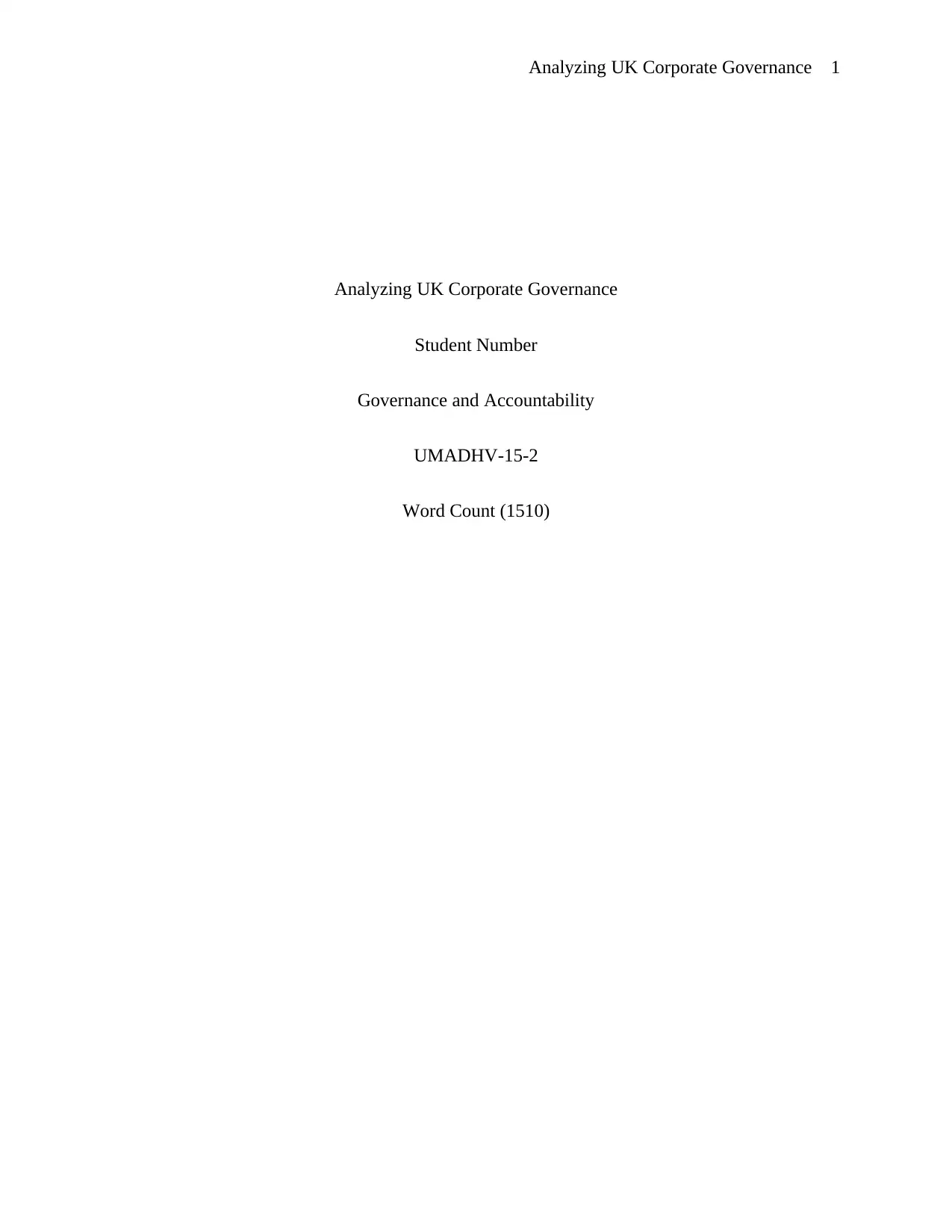
Analyzing UK Corporate Governance 1
Analyzing UK Corporate Governance
Student Number
Governance and Accountability
UMADHV-15-2
Word Count (1510)
Analyzing UK Corporate Governance
Student Number
Governance and Accountability
UMADHV-15-2
Word Count (1510)
Paraphrase This Document
Need a fresh take? Get an instant paraphrase of this document with our AI Paraphraser
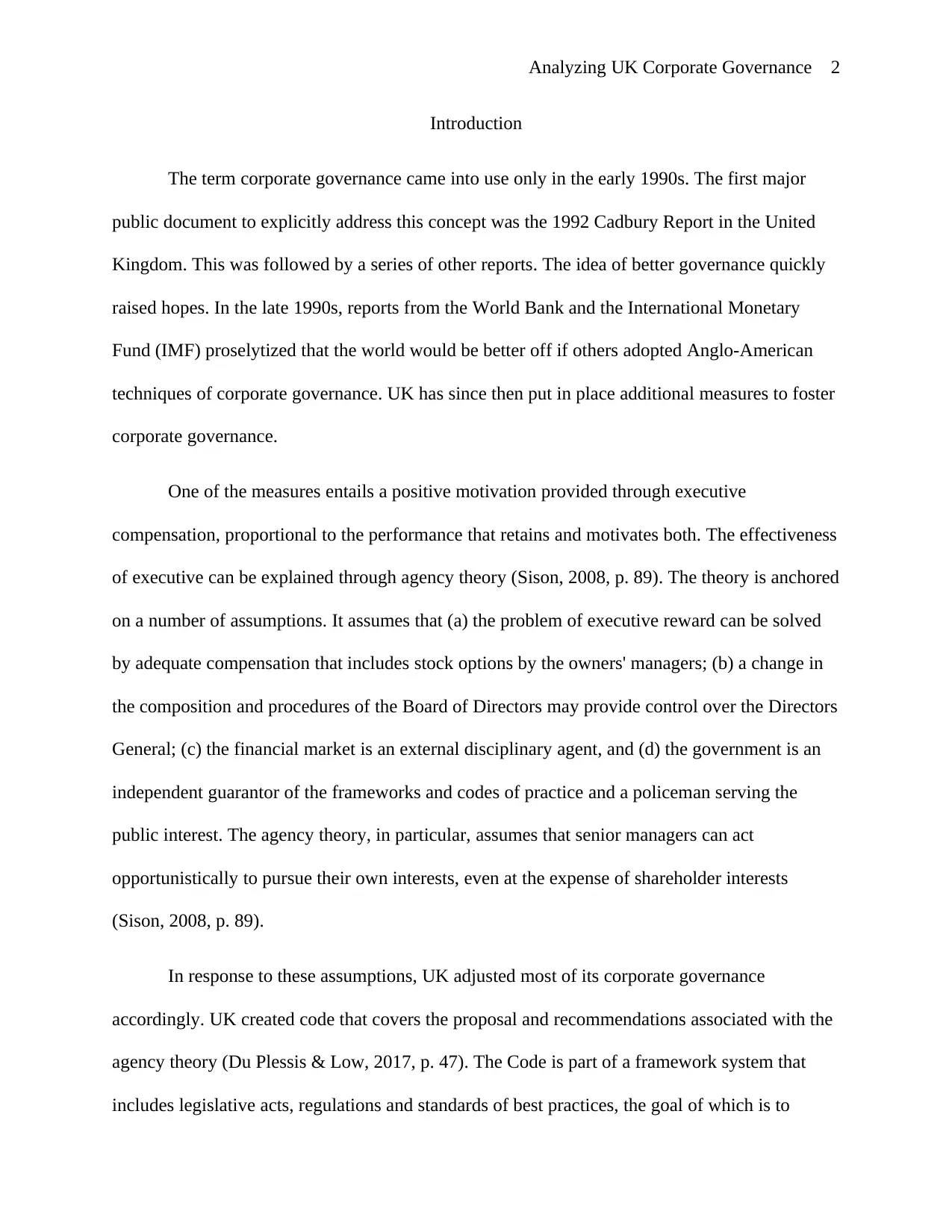
Analyzing UK Corporate Governance 2
Introduction
The term corporate governance came into use only in the early 1990s. The first major
public document to explicitly address this concept was the 1992 Cadbury Report in the United
Kingdom. This was followed by a series of other reports. The idea of better governance quickly
raised hopes. In the late 1990s, reports from the World Bank and the International Monetary
Fund (IMF) proselytized that the world would be better off if others adopted Anglo-American
techniques of corporate governance. UK has since then put in place additional measures to foster
corporate governance.
One of the measures entails a positive motivation provided through executive
compensation, proportional to the performance that retains and motivates both. The effectiveness
of executive can be explained through agency theory (Sison, 2008, p. 89). The theory is anchored
on a number of assumptions. It assumes that (a) the problem of executive reward can be solved
by adequate compensation that includes stock options by the owners' managers; (b) a change in
the composition and procedures of the Board of Directors may provide control over the Directors
General; (c) the financial market is an external disciplinary agent, and (d) the government is an
independent guarantor of the frameworks and codes of practice and a policeman serving the
public interest. The agency theory, in particular, assumes that senior managers can act
opportunistically to pursue their own interests, even at the expense of shareholder interests
(Sison, 2008, p. 89).
In response to these assumptions, UK adjusted most of its corporate governance
accordingly. UK created code that covers the proposal and recommendations associated with the
agency theory (Du Plessis & Low, 2017, p. 47). The Code is part of a framework system that
includes legislative acts, regulations and standards of best practices, the goal of which is to
Introduction
The term corporate governance came into use only in the early 1990s. The first major
public document to explicitly address this concept was the 1992 Cadbury Report in the United
Kingdom. This was followed by a series of other reports. The idea of better governance quickly
raised hopes. In the late 1990s, reports from the World Bank and the International Monetary
Fund (IMF) proselytized that the world would be better off if others adopted Anglo-American
techniques of corporate governance. UK has since then put in place additional measures to foster
corporate governance.
One of the measures entails a positive motivation provided through executive
compensation, proportional to the performance that retains and motivates both. The effectiveness
of executive can be explained through agency theory (Sison, 2008, p. 89). The theory is anchored
on a number of assumptions. It assumes that (a) the problem of executive reward can be solved
by adequate compensation that includes stock options by the owners' managers; (b) a change in
the composition and procedures of the Board of Directors may provide control over the Directors
General; (c) the financial market is an external disciplinary agent, and (d) the government is an
independent guarantor of the frameworks and codes of practice and a policeman serving the
public interest. The agency theory, in particular, assumes that senior managers can act
opportunistically to pursue their own interests, even at the expense of shareholder interests
(Sison, 2008, p. 89).
In response to these assumptions, UK adjusted most of its corporate governance
accordingly. UK created code that covers the proposal and recommendations associated with the
agency theory (Du Plessis & Low, 2017, p. 47). The Code is part of a framework system that
includes legislative acts, regulations and standards of best practices, the goal of which is to
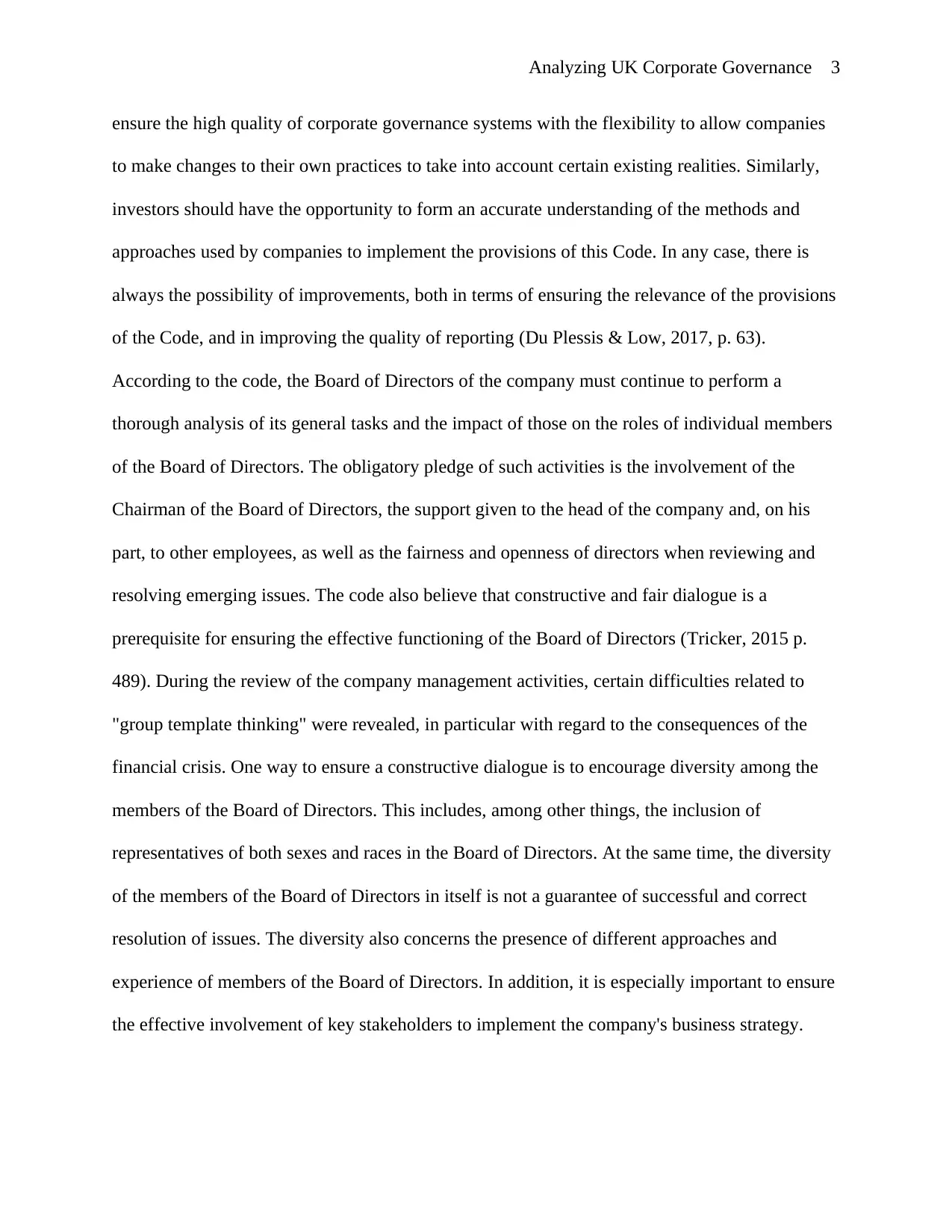
Analyzing UK Corporate Governance 3
ensure the high quality of corporate governance systems with the flexibility to allow companies
to make changes to their own practices to take into account certain existing realities. Similarly,
investors should have the opportunity to form an accurate understanding of the methods and
approaches used by companies to implement the provisions of this Code. In any case, there is
always the possibility of improvements, both in terms of ensuring the relevance of the provisions
of the Code, and in improving the quality of reporting (Du Plessis & Low, 2017, p. 63).
According to the code, the Board of Directors of the company must continue to perform a
thorough analysis of its general tasks and the impact of those on the roles of individual members
of the Board of Directors. The obligatory pledge of such activities is the involvement of the
Chairman of the Board of Directors, the support given to the head of the company and, on his
part, to other employees, as well as the fairness and openness of directors when reviewing and
resolving emerging issues. The code also believe that constructive and fair dialogue is a
prerequisite for ensuring the effective functioning of the Board of Directors (Tricker, 2015 p.
489). During the review of the company management activities, certain difficulties related to
"group template thinking" were revealed, in particular with regard to the consequences of the
financial crisis. One way to ensure a constructive dialogue is to encourage diversity among the
members of the Board of Directors. This includes, among other things, the inclusion of
representatives of both sexes and races in the Board of Directors. At the same time, the diversity
of the members of the Board of Directors in itself is not a guarantee of successful and correct
resolution of issues. The diversity also concerns the presence of different approaches and
experience of members of the Board of Directors. In addition, it is especially important to ensure
the effective involvement of key stakeholders to implement the company's business strategy.
ensure the high quality of corporate governance systems with the flexibility to allow companies
to make changes to their own practices to take into account certain existing realities. Similarly,
investors should have the opportunity to form an accurate understanding of the methods and
approaches used by companies to implement the provisions of this Code. In any case, there is
always the possibility of improvements, both in terms of ensuring the relevance of the provisions
of the Code, and in improving the quality of reporting (Du Plessis & Low, 2017, p. 63).
According to the code, the Board of Directors of the company must continue to perform a
thorough analysis of its general tasks and the impact of those on the roles of individual members
of the Board of Directors. The obligatory pledge of such activities is the involvement of the
Chairman of the Board of Directors, the support given to the head of the company and, on his
part, to other employees, as well as the fairness and openness of directors when reviewing and
resolving emerging issues. The code also believe that constructive and fair dialogue is a
prerequisite for ensuring the effective functioning of the Board of Directors (Tricker, 2015 p.
489). During the review of the company management activities, certain difficulties related to
"group template thinking" were revealed, in particular with regard to the consequences of the
financial crisis. One way to ensure a constructive dialogue is to encourage diversity among the
members of the Board of Directors. This includes, among other things, the inclusion of
representatives of both sexes and races in the Board of Directors. At the same time, the diversity
of the members of the Board of Directors in itself is not a guarantee of successful and correct
resolution of issues. The diversity also concerns the presence of different approaches and
experience of members of the Board of Directors. In addition, it is especially important to ensure
the effective involvement of key stakeholders to implement the company's business strategy.
⊘ This is a preview!⊘
Do you want full access?
Subscribe today to unlock all pages.

Trusted by 1+ million students worldwide
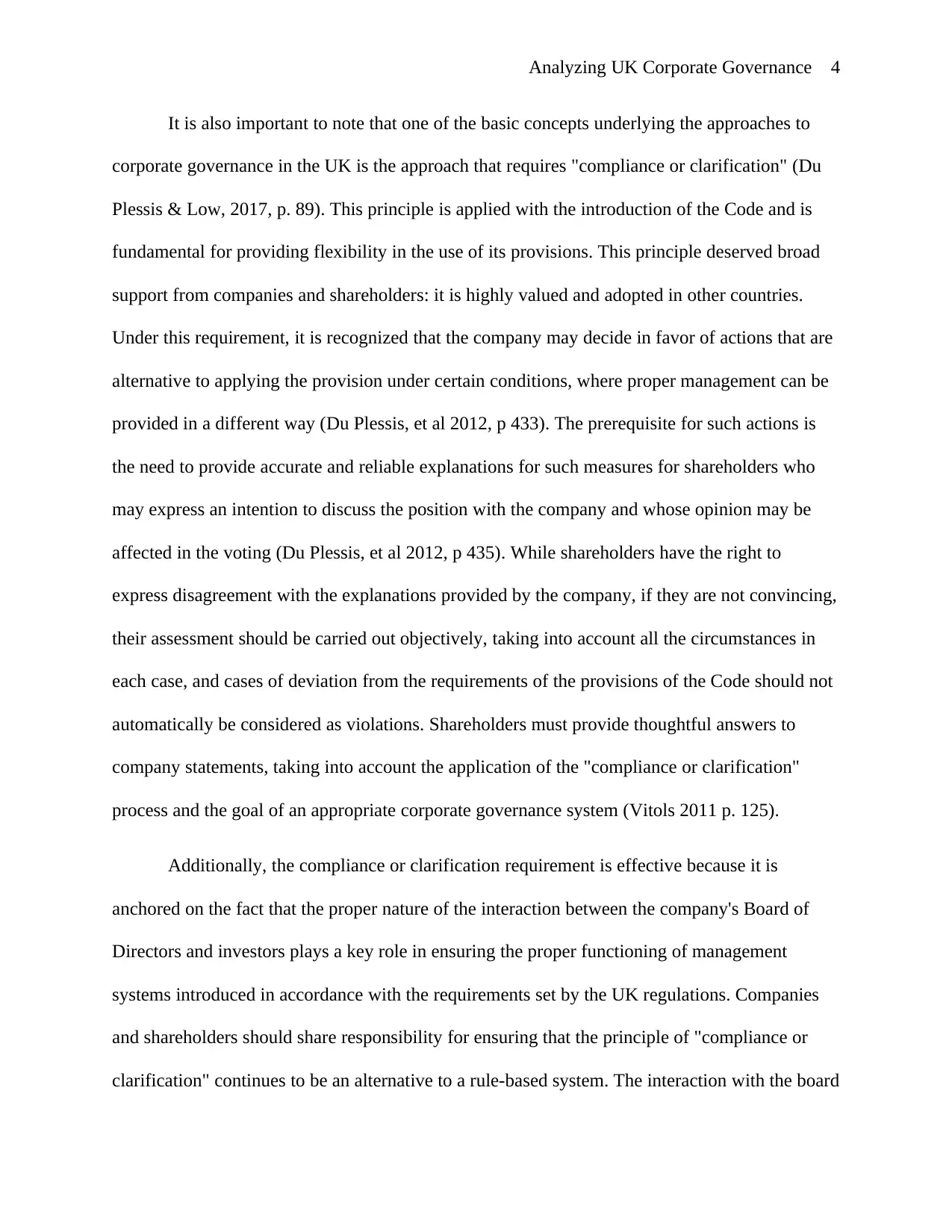
Analyzing UK Corporate Governance 4
It is also important to note that one of the basic concepts underlying the approaches to
corporate governance in the UK is the approach that requires "compliance or clarification" (Du
Plessis & Low, 2017, p. 89). This principle is applied with the introduction of the Code and is
fundamental for providing flexibility in the use of its provisions. This principle deserved broad
support from companies and shareholders: it is highly valued and adopted in other countries.
Under this requirement, it is recognized that the company may decide in favor of actions that are
alternative to applying the provision under certain conditions, where proper management can be
provided in a different way (Du Plessis, et al 2012, p 433). The prerequisite for such actions is
the need to provide accurate and reliable explanations for such measures for shareholders who
may express an intention to discuss the position with the company and whose opinion may be
affected in the voting (Du Plessis, et al 2012, p 435). While shareholders have the right to
express disagreement with the explanations provided by the company, if they are not convincing,
their assessment should be carried out objectively, taking into account all the circumstances in
each case, and cases of deviation from the requirements of the provisions of the Code should not
automatically be considered as violations. Shareholders must provide thoughtful answers to
company statements, taking into account the application of the "compliance or clarification"
process and the goal of an appropriate corporate governance system (Vitols 2011 p. 125).
Additionally, the compliance or clarification requirement is effective because it is
anchored on the fact that the proper nature of the interaction between the company's Board of
Directors and investors plays a key role in ensuring the proper functioning of management
systems introduced in accordance with the requirements set by the UK regulations. Companies
and shareholders should share responsibility for ensuring that the principle of "compliance or
clarification" continues to be an alternative to a rule-based system. The interaction with the board
It is also important to note that one of the basic concepts underlying the approaches to
corporate governance in the UK is the approach that requires "compliance or clarification" (Du
Plessis & Low, 2017, p. 89). This principle is applied with the introduction of the Code and is
fundamental for providing flexibility in the use of its provisions. This principle deserved broad
support from companies and shareholders: it is highly valued and adopted in other countries.
Under this requirement, it is recognized that the company may decide in favor of actions that are
alternative to applying the provision under certain conditions, where proper management can be
provided in a different way (Du Plessis, et al 2012, p 433). The prerequisite for such actions is
the need to provide accurate and reliable explanations for such measures for shareholders who
may express an intention to discuss the position with the company and whose opinion may be
affected in the voting (Du Plessis, et al 2012, p 435). While shareholders have the right to
express disagreement with the explanations provided by the company, if they are not convincing,
their assessment should be carried out objectively, taking into account all the circumstances in
each case, and cases of deviation from the requirements of the provisions of the Code should not
automatically be considered as violations. Shareholders must provide thoughtful answers to
company statements, taking into account the application of the "compliance or clarification"
process and the goal of an appropriate corporate governance system (Vitols 2011 p. 125).
Additionally, the compliance or clarification requirement is effective because it is
anchored on the fact that the proper nature of the interaction between the company's Board of
Directors and investors plays a key role in ensuring the proper functioning of management
systems introduced in accordance with the requirements set by the UK regulations. Companies
and shareholders should share responsibility for ensuring that the principle of "compliance or
clarification" continues to be an alternative to a rule-based system. The interaction with the board
Paraphrase This Document
Need a fresh take? Get an instant paraphrase of this document with our AI Paraphraser
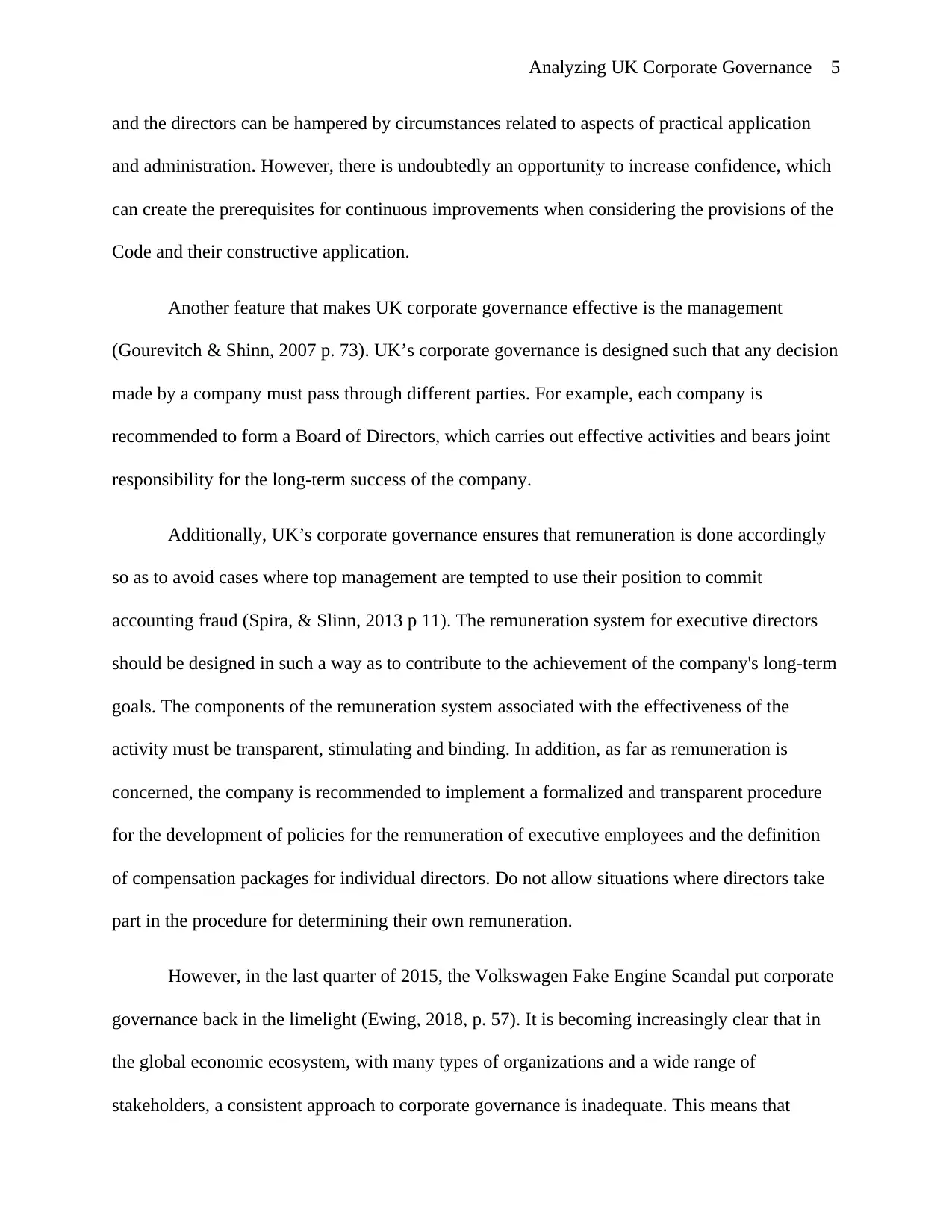
Analyzing UK Corporate Governance 5
and the directors can be hampered by circumstances related to aspects of practical application
and administration. However, there is undoubtedly an opportunity to increase confidence, which
can create the prerequisites for continuous improvements when considering the provisions of the
Code and their constructive application.
Another feature that makes UK corporate governance effective is the management
(Gourevitch & Shinn, 2007 p. 73). UK’s corporate governance is designed such that any decision
made by a company must pass through different parties. For example, each company is
recommended to form a Board of Directors, which carries out effective activities and bears joint
responsibility for the long-term success of the company.
Additionally, UK’s corporate governance ensures that remuneration is done accordingly
so as to avoid cases where top management are tempted to use their position to commit
accounting fraud (Spira, & Slinn, 2013 p 11). The remuneration system for executive directors
should be designed in such a way as to contribute to the achievement of the company's long-term
goals. The components of the remuneration system associated with the effectiveness of the
activity must be transparent, stimulating and binding. In addition, as far as remuneration is
concerned, the company is recommended to implement a formalized and transparent procedure
for the development of policies for the remuneration of executive employees and the definition
of compensation packages for individual directors. Do not allow situations where directors take
part in the procedure for determining their own remuneration.
However, in the last quarter of 2015, the Volkswagen Fake Engine Scandal put corporate
governance back in the limelight (Ewing, 2018, p. 57). It is becoming increasingly clear that in
the global economic ecosystem, with many types of organizations and a wide range of
stakeholders, a consistent approach to corporate governance is inadequate. This means that
and the directors can be hampered by circumstances related to aspects of practical application
and administration. However, there is undoubtedly an opportunity to increase confidence, which
can create the prerequisites for continuous improvements when considering the provisions of the
Code and their constructive application.
Another feature that makes UK corporate governance effective is the management
(Gourevitch & Shinn, 2007 p. 73). UK’s corporate governance is designed such that any decision
made by a company must pass through different parties. For example, each company is
recommended to form a Board of Directors, which carries out effective activities and bears joint
responsibility for the long-term success of the company.
Additionally, UK’s corporate governance ensures that remuneration is done accordingly
so as to avoid cases where top management are tempted to use their position to commit
accounting fraud (Spira, & Slinn, 2013 p 11). The remuneration system for executive directors
should be designed in such a way as to contribute to the achievement of the company's long-term
goals. The components of the remuneration system associated with the effectiveness of the
activity must be transparent, stimulating and binding. In addition, as far as remuneration is
concerned, the company is recommended to implement a formalized and transparent procedure
for the development of policies for the remuneration of executive employees and the definition
of compensation packages for individual directors. Do not allow situations where directors take
part in the procedure for determining their own remuneration.
However, in the last quarter of 2015, the Volkswagen Fake Engine Scandal put corporate
governance back in the limelight (Ewing, 2018, p. 57). It is becoming increasingly clear that in
the global economic ecosystem, with many types of organizations and a wide range of
stakeholders, a consistent approach to corporate governance is inadequate. This means that
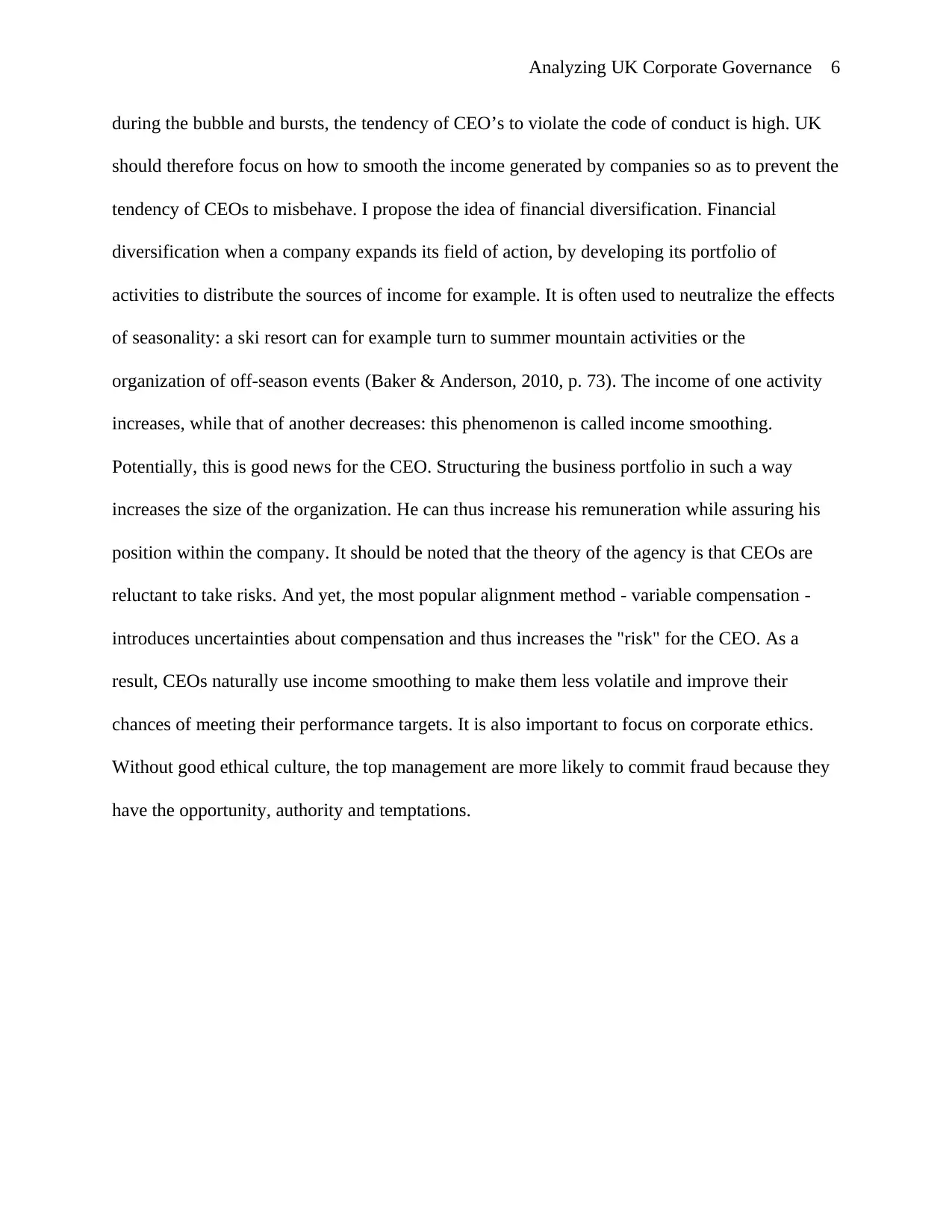
Analyzing UK Corporate Governance 6
during the bubble and bursts, the tendency of CEO’s to violate the code of conduct is high. UK
should therefore focus on how to smooth the income generated by companies so as to prevent the
tendency of CEOs to misbehave. I propose the idea of financial diversification. Financial
diversification when a company expands its field of action, by developing its portfolio of
activities to distribute the sources of income for example. It is often used to neutralize the effects
of seasonality: a ski resort can for example turn to summer mountain activities or the
organization of off-season events (Baker & Anderson, 2010, p. 73). The income of one activity
increases, while that of another decreases: this phenomenon is called income smoothing.
Potentially, this is good news for the CEO. Structuring the business portfolio in such a way
increases the size of the organization. He can thus increase his remuneration while assuring his
position within the company. It should be noted that the theory of the agency is that CEOs are
reluctant to take risks. And yet, the most popular alignment method - variable compensation -
introduces uncertainties about compensation and thus increases the "risk" for the CEO. As a
result, CEOs naturally use income smoothing to make them less volatile and improve their
chances of meeting their performance targets. It is also important to focus on corporate ethics.
Without good ethical culture, the top management are more likely to commit fraud because they
have the opportunity, authority and temptations.
during the bubble and bursts, the tendency of CEO’s to violate the code of conduct is high. UK
should therefore focus on how to smooth the income generated by companies so as to prevent the
tendency of CEOs to misbehave. I propose the idea of financial diversification. Financial
diversification when a company expands its field of action, by developing its portfolio of
activities to distribute the sources of income for example. It is often used to neutralize the effects
of seasonality: a ski resort can for example turn to summer mountain activities or the
organization of off-season events (Baker & Anderson, 2010, p. 73). The income of one activity
increases, while that of another decreases: this phenomenon is called income smoothing.
Potentially, this is good news for the CEO. Structuring the business portfolio in such a way
increases the size of the organization. He can thus increase his remuneration while assuring his
position within the company. It should be noted that the theory of the agency is that CEOs are
reluctant to take risks. And yet, the most popular alignment method - variable compensation -
introduces uncertainties about compensation and thus increases the "risk" for the CEO. As a
result, CEOs naturally use income smoothing to make them less volatile and improve their
chances of meeting their performance targets. It is also important to focus on corporate ethics.
Without good ethical culture, the top management are more likely to commit fraud because they
have the opportunity, authority and temptations.
⊘ This is a preview!⊘
Do you want full access?
Subscribe today to unlock all pages.

Trusted by 1+ million students worldwide
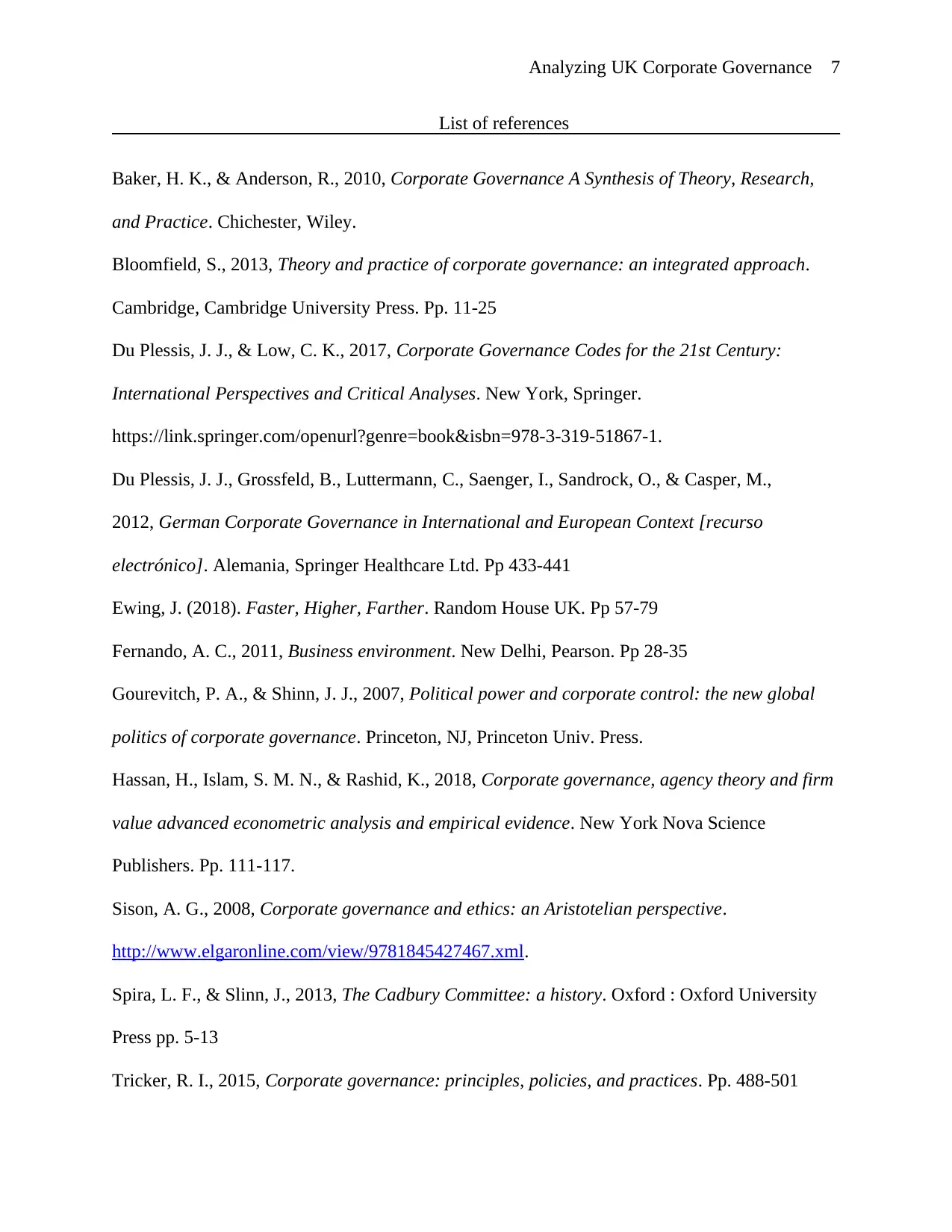
Analyzing UK Corporate Governance 7
List of references
Baker, H. K., & Anderson, R., 2010, Corporate Governance A Synthesis of Theory, Research,
and Practice. Chichester, Wiley.
Bloomfield, S., 2013, Theory and practice of corporate governance: an integrated approach.
Cambridge, Cambridge University Press. Pp. 11-25
Du Plessis, J. J., & Low, C. K., 2017, Corporate Governance Codes for the 21st Century:
International Perspectives and Critical Analyses. New York, Springer.
https://link.springer.com/openurl?genre=book&isbn=978-3-319-51867-1.
Du Plessis, J. J., Grossfeld, B., Luttermann, C., Saenger, I., Sandrock, O., & Casper, M.,
2012, German Corporate Governance in International and European Context [recurso
electrónico]. Alemania, Springer Healthcare Ltd. Pp 433-441
Ewing, J. (2018). Faster, Higher, Farther. Random House UK. Pp 57-79
Fernando, A. C., 2011, Business environment. New Delhi, Pearson. Pp 28-35
Gourevitch, P. A., & Shinn, J. J., 2007, Political power and corporate control: the new global
politics of corporate governance. Princeton, NJ, Princeton Univ. Press.
Hassan, H., Islam, S. M. N., & Rashid, K., 2018, Corporate governance, agency theory and firm
value advanced econometric analysis and empirical evidence. New York Nova Science
Publishers. Pp. 111-117.
Sison, A. G., 2008, Corporate governance and ethics: an Aristotelian perspective.
http://www.elgaronline.com/view/9781845427467.xml.
Spira, L. F., & Slinn, J., 2013, The Cadbury Committee: a history. Oxford : Oxford University
Press pp. 5-13
Tricker, R. I., 2015, Corporate governance: principles, policies, and practices. Pp. 488-501
List of references
Baker, H. K., & Anderson, R., 2010, Corporate Governance A Synthesis of Theory, Research,
and Practice. Chichester, Wiley.
Bloomfield, S., 2013, Theory and practice of corporate governance: an integrated approach.
Cambridge, Cambridge University Press. Pp. 11-25
Du Plessis, J. J., & Low, C. K., 2017, Corporate Governance Codes for the 21st Century:
International Perspectives and Critical Analyses. New York, Springer.
https://link.springer.com/openurl?genre=book&isbn=978-3-319-51867-1.
Du Plessis, J. J., Grossfeld, B., Luttermann, C., Saenger, I., Sandrock, O., & Casper, M.,
2012, German Corporate Governance in International and European Context [recurso
electrónico]. Alemania, Springer Healthcare Ltd. Pp 433-441
Ewing, J. (2018). Faster, Higher, Farther. Random House UK. Pp 57-79
Fernando, A. C., 2011, Business environment. New Delhi, Pearson. Pp 28-35
Gourevitch, P. A., & Shinn, J. J., 2007, Political power and corporate control: the new global
politics of corporate governance. Princeton, NJ, Princeton Univ. Press.
Hassan, H., Islam, S. M. N., & Rashid, K., 2018, Corporate governance, agency theory and firm
value advanced econometric analysis and empirical evidence. New York Nova Science
Publishers. Pp. 111-117.
Sison, A. G., 2008, Corporate governance and ethics: an Aristotelian perspective.
http://www.elgaronline.com/view/9781845427467.xml.
Spira, L. F., & Slinn, J., 2013, The Cadbury Committee: a history. Oxford : Oxford University
Press pp. 5-13
Tricker, R. I., 2015, Corporate governance: principles, policies, and practices. Pp. 488-501
Paraphrase This Document
Need a fresh take? Get an instant paraphrase of this document with our AI Paraphraser

Analyzing UK Corporate Governance 8
Vitols, S., 2011, The sustainable company: a new approch to corporate governance. Brussels,
ETUI aisbl. Pp. 123-127
Vitols, S., 2011, The sustainable company: a new approch to corporate governance. Brussels,
ETUI aisbl. Pp. 123-127
1 out of 8
Related Documents
Your All-in-One AI-Powered Toolkit for Academic Success.
+13062052269
info@desklib.com
Available 24*7 on WhatsApp / Email
![[object Object]](/_next/static/media/star-bottom.7253800d.svg)
Unlock your academic potential
Copyright © 2020–2026 A2Z Services. All Rights Reserved. Developed and managed by ZUCOL.



